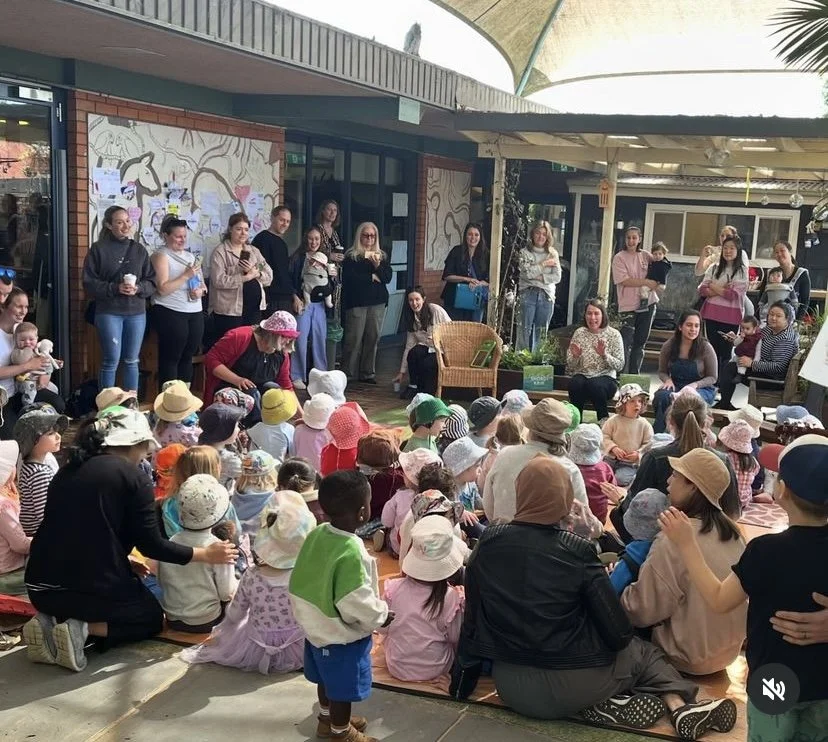We are at Styles Street, Where Life is Sweet...
Date: 4.9.2024
At Styles Street, we are committed to working towards reconciliation by embedding First Nations histories, knowledge, cultures, and languages within our program and practice. This year, to celebrate Indigenous Literacy Day, we participated in the Indigenous Literacy Foundation's (ILF) fundraiser, Busking for Change. Over the past month, the children have been learning the lyrics of the song Shordi Krik with the goal of coming together on Indigenous Literacy Day to sing the song as a community.
As we practiced, we realised that while the children were making great progress in learning the lyrics and loved singing the song, many didn’t fully understand the meaning behind the Busking for Change initiative. To help them grasp the broader context and purpose of this work, we decided to dive deeper into the ILF’s mission.
We explored the Busking for Change poster that many children had seen around the center, observed several books published by the ILF, and engaged with the Map of Indigenous Australia. As we studied the poster and books, we noticed the ILF logo on each of them. This prompted us to take a closer look at Shordi Krik, and I explained that the creek is a real place in a small Aboriginal community in Barunga, Northern Territory. The song was written by children at Barunga Remote Community School. We also noted that the book was written in two languages: English and Kriol, the main language spoken in Barunga.
Using the map, we located Barunga. It wasn’t easy to find, but we managed! We noticed how far away it was from Wangal land, estimating that it might take at least five plane rides to get there. The children asked many questions about where we are and the names of other countries, and I loved hearing them refer to the lands as “countries,” recognising that the colours on the map represented different Aboriginal lands. Our discussion about Shordi Krik and its connection to a real place expanded their understanding of the rich diversity of Aboriginal lands in Australia. I was absolutely blown away when, after our group time, the children could remember where Barunga was and locate it on the map!
We also talked about how the Indigenous Literacy Foundation creates many books in Aboriginal languages. I showed the children other books written in various Aboriginal and Torres Strait Islander languages, and the key takeaway for them was that books can be written in languages other than English. This prompted the children to share their knowledge of languages they knew or spoke. One child mentioned Korean, another mentioned Portuguese and another Chinese. Although the countries where these languages are spoken in were not on the map we were exploring, it demonstrated the connections they were making.
To deepen our exploration of connections to place and Country, we reflected on what children from Barunga loved about Shordi Krik—long grass, cheeky dogs, muddy water, colorful tunnels, and more. I then invited the children to think about what they love about Wangal land, where we learn and play every day. Their responses were varied, painting a picture of their connection to our space and how they enjoy spending their time here. Many children spoke fondly of water play, while others shared how much they enjoy creating art or sliding down the slides. Playing with friends featured prominently in their answers, along with a shared love for Jason’s cooking. The sandpit was also a favorite, as was the thrill of jumping off the balance beams. Some children talked about how much they love playing with blocks or dinosaurs, while others mentioned their appreciation for the flowers and bamboo trees that add beauty to our surroundings. These reflections not only highlighted their individual preferences but also wove together a collective sense of connection to the land where we learn and play every day.
When Indigenous Literacy Day finally arrived, we were confident that the children understood why we were celebrating. The day was made even more special by the presence of so many parents who came to join us. We were also fortunate to have Alexander’s parents accompany us on violin and guitar, as well as Lewie’s Papa on guitar. As part of the Busking for Change initiative, our community proudly raised $960, contributing to the Indigenous Literacy Foundation's efforts to support remote communities in writing, illustrating, and publishing books in the languages they speak at home. This event became not just a celebration of Indigenous languages and literacy but also a celebration of community and how capable and competent our children truly are. They learned a long and challenging song, and this entire journey reflects our belief in their abilities and high expectations for their learning.
As always, our learning continues. We shared with the children a video of the ILF’s Indigenous Literacy Day celebration at the Opera House, where they could see how others participated in the initiative just like us. The children sang along as Justine Clarke and Josh Pyke played ukulele and guitar. We also learned that next year’s event will feature a new book, Country Tells Us, which explores Aboriginal seasons on Yawuru land. We are excited to explore this book with the children.
This experience has been incredibly rewarding, offering valuable learning opportunities for the children. Through their engagement with Shordi Krik, they have learned a beautiful song, improved their visual literacy, deepened their connection to the Styles Street community, and gained a better understanding of Aboriginal and Torres Strait Islander relationships with Country. They also developed a growing appreciation for our First Nations linguistic diversity.
To extend this learning, I would love to explore the concept of connection to Country and place even further. Drawing on the children's responses about what they love at Styles Street, perhaps we can create our own book: We are at Styles Street, Where Life Is Sweet..
(a reflection from the Gugan room)
Written by Cherie Longden

